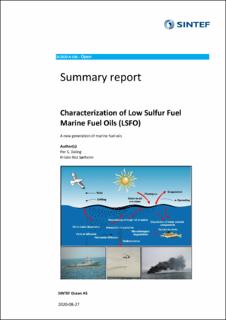| dc.contributor.author | Daling, Per Snorre | |
| dc.contributor.author | Sørheim, Kristin Rist | |
| dc.date.accessioned | 2020-08-30T12:56:02Z | |
| dc.date.available | 2020-08-30T12:56:02Z | |
| dc.date.created | 2020-08-28T13:04:06Z | |
| dc.date.issued | 2020-06-27 | |
| dc.identifier.isbn | 978-82-7174-397-0 | |
| dc.identifier.uri | https://hdl.handle.net/11250/2675579 | |
| dc.description.abstract | This is a summary report of the Multi-client project "Characterization of Low Sulfur Fuel Oils (LSFO) – A new generation of marine fuel oils" (2019-2020). The project has been funded by MPRI/Fisheries and Ocean-DFO Canada, ITOPF (R&D Award) and the Norwegian Coastal Administration (NCA). In order to meet new requirements for lower sulfur oxides (SOx) emissions to the air, new generation of low sulfur marine fuel oil (LSFO) are now replacing the traditional Intermediate fuels and heavy fuel oils (like IFO 180 and IFO 380) with "Ultra Low Sulfur Oils" – ULSFO (S ≤0.10 % m/m), for use in the Sulfur Emission Control Area (SECA) in Europe and North America from 2015, and a Global Sulfur Cap regulation was implemented from 2020 with "Very Low Sulfur Oils" (S ≤ 0.50 %m/m). This project aims to provide responders better knowledge and preparedness for spills involving new generation of low sulfur residual marine fuel oil on the market today. The project included laboratory studies with focus on fate and behaviour, potential toxicity and with relevance to the effectiveness of different oil spill response options (use of dispersants and in-situ burning). Test methodologies was also subjected to an interlaboratory study and experiments performed both in Norway (SINTEF) and in Canada (SL Ross) on one of the tested oils. The companies mentioned in this report provided samples for investigation of the fuel’s characteristics when spilled in sea water to help with the development of an industry response strategy for a new generation of low-sulfur fuel oils. Many of the low-sulfur fuels being developed by the industry share similar compositions, so it is important to notice that the findings of this report are not unique to the fuel samples analysed. The results of this study are indicative of a new generation of marine fuel oil across the wider industry. Further laboratory analysis of low-sulfur fuel oils from other suppliers is needed to give a clearer understanding of the characteristics and behaviours of individual products. | en_US |
| dc.language.iso | eng | en_US |
| dc.publisher | SINTEF Ocean AS | en_US |
| dc.relation.ispartofseries | SINTEF Ocean rapporter;OC2020 A-106 | |
| dc.rights | Attribution-NonCommercial-NoDerivatives 4.0 Internasjonal | * |
| dc.rights.uri | http://creativecommons.org/licenses/by-nc-nd/4.0/deed.no | * |
| dc.subject | Low Sulfur Fuel Oil - LSFO | en_US |
| dc.subject | WAF/Toxicity | en_US |
| dc.subject | Oil spill response | en_US |
| dc.subject | Dispersibility | en_US |
| dc.subject | Ignitability/ISB | en_US |
| dc.subject | Weathering at sea | en_US |
| dc.title | Characterization of Low Sulfur Fuel Marine Fuel Oils (LSFO) - A new generation of marine fuel oils | en_US |
| dc.type | Research report | en_US |
| dc.description.version | publishedVersion | en_US |
| dc.rights.holder | © SINTEF Ocean AS 2020 | en_US |
| dc.source.pagenumber | 18 | en_US |
| dc.identifier.cristin | 1825773 | |
| cristin.ispublished | true | |
| cristin.fulltext | original | |

